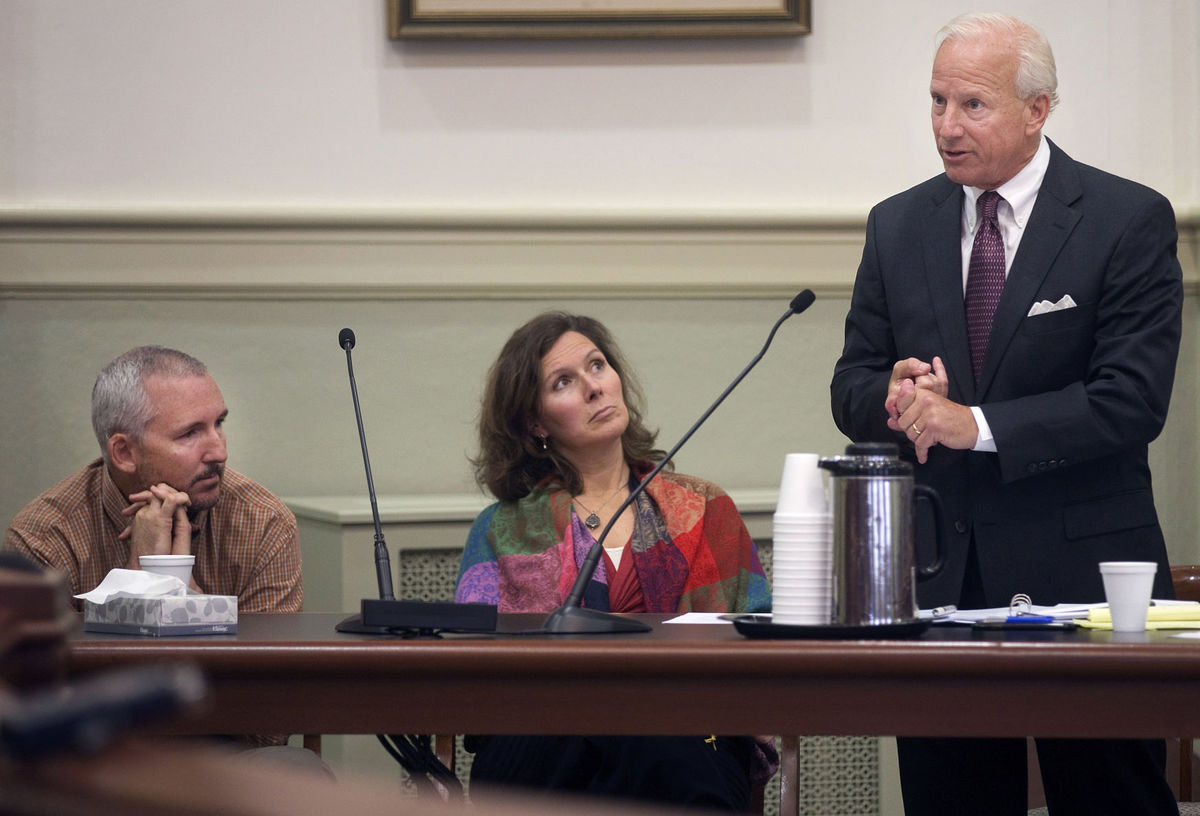Judge’s Ruling Permits Pipeline Surveying of Franklin County Farm
By Duncan Adams
ROCKY MOUNT — The judge described Virginia’s pipeline surveying law as a “legislative failure” but said Monday that he felt compelled to enforce it.
The extended family that owns and operates Four Corners Farm in Franklin County repelled surveyors working for Mountain Valley Pipeline five times over the course of about 13 months.
After a hearing Monday, Franklin County Circuit Court Judge William Alexander ordered the family not to interfere the next time surveyors come calling — which will likely be over the course of three days next week.
Alexander granted the injunction sought by Mountain Valley to prohibit such interference. He said the pipeline company has a right to access the property under the Virginia law that allows surveyors working for natural gas companies to enter private property without permission as long as the company has provided adequate notice as defined by the statute.
He said denial of that statutory right would constitute irreparable harm to Mountain Valley, as would delays that might result from being unable to complete surveying.
Beginning in May 2016, survey crews have been trying to access Four Corners Farm — owned by David and Betty Werner, their daughter, Carolyn Reilly, and her husband, Ian Reilly. As envisioned by Mountain Valley, the route for the controversial natural gas pipeline would burrow through a portion of the family’s 58-acre farm off Old Mill Creek Lane.
On Monday, after a hearing of more than two hours, Carolyn Reilly reacted to Alexander’s ruling, noting that Mountain Valley had argued that delays could affect revenues, shippers of natural gas on the pipeline and the reputation of the companies involved in the $3.5 billion joint venture.
“The bottom line for me is that money talks,” she said. “It’s another win for money.”
Most recently, on June 1, the Werners and Reillys worked together to halt a crew of about 18 surveyors attempting to enter their property near the confluence of Little and Teel creeks until officers arrived from the Franklin County sheriff’s department. After officers reached the scene, supervisors of the surveyors agreed to direct the crew to leave the property and to seek a court order sanctioning access.
On Monday, Alexander granted that order. But he expressed ambivalence about the law.
“I think this whole statute is a legislative failure, frankly,” he said.
Enacted in 2004, the law has provoked bitter disputes between landowners and survey crews seeking routes through Virginia for both the proposed Mountain Valley Pipeline and the separate but similar Atlantic Coast Pipeline. Each venture would begin in West Virginia and transport natural gas at high pressure through a 42-inch diameter buried pipeline.
Even though surveying continues, both projects say about 98 percent of that work in Virginia is complete.
The Mountain Valley Pipeline’s proposed path would travel through 11 counties in West Virginia and six in Virginia. It would terminate near Chatham at the Transco Pipeline. Seth Land, an attorney representing Mountain Valley at Monday’s hearing, noted that the pipeline could supply natural gas to Franklin County.
Like many landowners potentially affected by the project, the Reillys and Werners first learned about the pipeline in 2014.
In February, Carolyn Reilly was hired by Bold Alliance as a “pipeline fighter” and tasked with organizing opposition to both the Mountain Valley and Atlantic Coast projects.
Chuck Lollar, the Norfolk-based lawyer representing the Reillys and Werners during Monday’s hearing, has landowner clients living along the routes of both pipelines. He learned in August that the Virginia Supreme Court will hear his appeal of the state’s surveying law. He filed the appeal in May on behalf of property owners in Nelson County who had resisted surveying by crews working for Atlantic Coast.
Lollar’s appeal contends that the surveys insisted upon by Atlantic Coast Pipeline were not necessary to meet regulatory requirements, which he says is one condition of the state law. And he argues that the law violates the Virginia Constitution because surveys are an illegal taking of private property without compensation.
Justin Lugar, a lawyer in Roanoke, has challenged the survey law in a federal lawsuit filed in Roanoke on behalf of 17 plaintiffs who own 10 properties along the proposed route of the Mountain Valley Pipeline. The lawsuit alleged that surveys of private property without an owner’s permission represent unconstitutional takings.
He also tackled larger issues.
As interstate pipelines, both the Mountain Valley and Atlantic Coast projects need approval from the Federal Energy Regulatory Commission. If FERC approves the pipelines, each will have access to eminent domain to acquire easements across private properties.
Lugar argued in the lawsuit that FERC should not be able to grant the power of eminent domain to a private company for its pursuit of “private pecuniary gain.”
In a letter to the Reillys dated Sept. 6, Mountain Valley cited the potential for FERC to authorize eminent domain. The letter offered the family a one-time payment of more than $51,250 to obtain an easement across the farm. The company described the proposed payment as a final offer that would be withdrawn after Sept. 20.
Carolyn Reilly said Monday that the family will reject the offer.
Lollar told Alexander that Mountain Valley will not have the power of eminent domain unless FERC grants the certificate needed to proceed with construction. Surveying could be completed after certification, he said.
During testimony Monday, Ricky Myers, an engineering manager for EQT Corp., a major partner in the Mountain Valley project, referenced certification.
“We believe we are on track to get a certificate next week,” Myers said.
Robin Wall, an employee of Coates Field Service who has helped coordinate surveying along the route of the Mountain Valley Pipeline, testified during Monday’s hearing that she had visited Carolyn Reilly’s Facebook page and seen that the family had previously invited “water protectors” to help them resist surveying.
After Monday’s hearing, Reilly said the family has a right to invite anyone to their farm.
